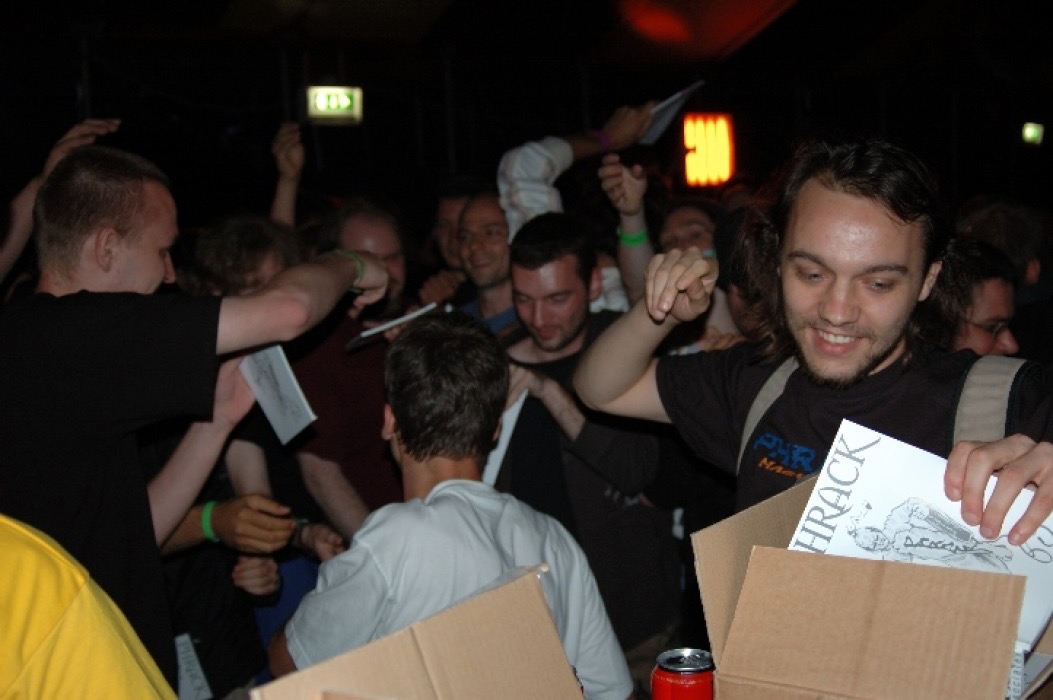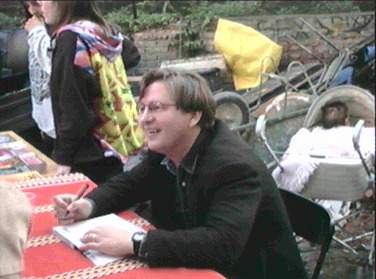|
Phrack
''Phrack'' is an e-zine written by and for Hacker (computer security), hackers, first published November 17, 1985. It had a wide circulation which included both hackers and computer security professionals. Originally covering subjects related to phreaking, anarchy and Software cracking, cracking, its articles also cover a wide range of topics including computer security, computer and physical security, hack (technology slang), hacking, cryptography, Counterculture, counter culture and international news. ''Phrack'' has been described as having "had its finger on the pulse of hacker culture", and being "hugely influential in the early days of hacker culture". Publications E-Zine Releases Issues of ''Phrack'' are divided in volumes, covering 1 or more years of publication. Hardcover Releases There were 3 hardcover releases. Each hardcover release contained most (but not all) articles of the e-zine release. Both the hardcover and e-zine were released simultaneously. History ... [...More Info...] [...Related Items...] OR: [Wikipedia] [Google] [Baidu] |
Knight Lightning
Craig Neidorf (born 1969), Knight Lightning, is an American editor. He was one of the founding editors of ''Phrack'' Magazine, an Online magazine, ezine. In 1990, he was charged for fraud, though later the charges were dropped. The case was a catalyst in the founding of the Electronic Frontier Foundation. Prophet, a witness, admitted that he had never known Neidorf to break in to any computer. Also that no one in the Legion of Doom (hacker group), Legion of Doom considered Craig a hacker. Biography Craig Neidorf studied at University of Missouri. In 1985, Craig, along with Randy Tischler (aka Taran King), came up with the concept of ''Phrack'' and started publishing it since then. In February 1990, Neidorf was arrested and was charged with fraud and interstate transportation of stolen property for stealing a confidential document, the E911 document, from the BellSouth, Bell South telephone company and with publicly distributing it in february 1989. BellSouth described the d ... [...More Info...] [...Related Items...] OR: [Wikipedia] [Google] [Baidu] |
Phreaking
Phreaking is a slang term coined to describe the activity of a culture of people who study, experiment with, or explore telecommunication systems, such as equipment and systems connected to public telephone networks. The term ''phreak'' is a sensational spelling of the word '' freak'' with the ''ph-'' from '' phone'', and may also refer to the use of various audio frequencies to manipulate a phone system. ''Phreak'', ''phreaker'', or ''phone phreak'' are names used for and by individuals who participate in phreaking. The term first referred to groups who had reverse engineered the system of tones used to route long-distance calls. By re-creating the signaling tones, phreaks could switch calls from the phone handset while avoiding long-distance calling charges which were common then. These fees could be significant, depending on the time, duration and destination of the call. To ease the creation of the routing tones, electronic tone generators known as blue boxes became a stap ... [...More Info...] [...Related Items...] OR: [Wikipedia] [Google] [Baidu] |
Hack (technology Slang)
A hacker is a person skilled in information technology who achieves goals and solves problems by non-standard means. The term has become associated in popular culture with a security hackersomeone with knowledge of bugs or exploits to break into computer systems and access data which would otherwise be inaccessible to them. In a positive connotation, though, hacking can also be utilized by legitimate figures in legal situations. For example, law enforcement agencies sometimes use hacking techniques to collect evidence on criminals and other malicious actors. This could include using anonymity tools (such as a VPN or the dark web) to mask their identities online and pose as criminals. Hacking can also have a broader sense of any roundabout solution to a problem, or programming and hardware development in general, and hacker culture has spread the term's broader usage to the general public even outside the profession or hobby of electronics (see life hack). Etymology The term ... [...More Info...] [...Related Items...] OR: [Wikipedia] [Google] [Baidu] |
Erik Bloodaxe (hacker)
Chris Goggans (also known as Erik Bloodaxe in honor of the Viking king Eric I of Norway) is an American hacker, a founding member of the Legion of Doom group, and a former editor of ''Phrack'' magazine. He is known as an expert in security as well as for his statements on hacker ethics and responsibility. Career history Around 1990-1991, Goggans and other Legion members set up a computer security firm, Comsec, which went out of business by 1992. He later became a senior network security engineer for WheelGroup, a network security group. In his closing remarks at a 1995 conference, Goggans remarked that the global hacker community was disorganized and uncoordinated, suggesting that they should focus an attack on some foreign country, such as France. , Goggans is a recognized expert on information security. He has performed network security assessments for some of the world's largest corporations, including all facets of critical infrastructure, with work spanning 22 countries a ... [...More Info...] [...Related Items...] OR: [Wikipedia] [Google] [Baidu] |
Hackers At Large
A hacker is a person skilled in information technology who achieves goals and solves problems by non-standard means. The term has become associated in popular culture with a security hackersomeone with knowledge of bugs or exploits to break into computer systems and access data which would otherwise be inaccessible to them. In a positive connotation, though, hacking can also be utilized by legitimate figures in legal situations. For example, law enforcement agencies sometimes use hacking techniques to collect evidence on criminals and other malicious actors. This could include using anonymity tools (such as a VPN or the dark web) to mask their identities online and pose as criminals. Hacking can also have a broader sense of any roundabout solution to a problem, or programming and hardware development in general, and hacker culture has spread the term's broader usage to the general public even outside the profession or hobby of electronics (see life hack). Etymology The ... [...More Info...] [...Related Items...] OR: [Wikipedia] [Google] [Baidu] |
Hacker (computer Security)
A security hacker or security researcher is someone who explores methods for breaching or bypassing defenses and exploiting weaknesses in a computer system or network. Hackers may be motivated by a multitude of reasons, such as profit, protest, sabotage, information gathering, challenge, recreation, or evaluation of a system weaknesses to assist in formulating defenses against potential hackers. Longstanding controversy surrounds the meaning of the term "hacker". In this controversy, computer programmers reclaim the term ''hacker'', arguing that it refers simply to someone with an advanced understanding of computers and computer networks, and that ''cracker'' is the more appropriate term for those who break into computers, whether computer criminals ( black hats) or computer security experts ( white hats). A 2014 article noted that "the black-hat meaning still prevails among the general public". The subculture that has evolved around hackers is often referred to as the "co ... [...More Info...] [...Related Items...] OR: [Wikipedia] [Google] [Baidu] |
The Hacker Crackdown
''The Hacker Crackdown: Law and Disorder on the Electronic Frontier'' is a work of nonfiction by Bruce Sterling first published in 1992. The book discusses watershed events in the hacker subculture in the early 1990s. The most notable topic covered is Operation Sundevil and the events surrounding the 1987–1990 war on the Legion of Doom network: the raid on Steve Jackson Games, the trial of "Knight Lightning" (one of the original journalists of ''Phrack''), and the subsequent formation of the Electronic Frontier Foundation. The book also profiles the likes of " Emmanuel Goldstein" (publisher of '' 2600: The Hacker Quarterly''), the former assistant attorney general of Arizona Gail Thackeray, FLETC instructor Carlton Fitzpatrick, Mitch Kapor, and John Perry Barlow. In 1994, Sterling released the book for the Internet with a new afterword. Critical reception Cory Doctorow, who voiced an unabridged podcast of the book, said it "inspired me politically, artistically and socially ... [...More Info...] [...Related Items...] OR: [Wikipedia] [Google] [Baidu] |
Operation Sundevil
Operation Sundevil was a 1990 nationwide United States Secret Service crackdown on "illegal computer hacking activities." It involved raids in approximately fifteen different cities and resulted in three arrests and the confiscation of computers, the contents of electronic bulletin board systems (BBSes), and floppy disks. It was revealed in a press release on May 9, 1990. The arrests and subsequent court cases resulted in the creation of the Electronic Frontier Foundation. The operation is now seen as largely a public-relations stunt. Operation Sundevil has also been viewed as one of the preliminary attacks on the Legion of Doom and similar hacking groups. The raid on Steve Jackson Games, which led to the court case '' Steve Jackson Games, Inc. v. United States Secret Service'', is often attributed to Operation Sundevil, but the Electronic Frontier Foundation states that it is unrelated and cites this attribution as a media error. The name comes from the Sun Devil Stadium of Arizo ... [...More Info...] [...Related Items...] OR: [Wikipedia] [Google] [Baidu] |
Bruce Sterling
Michael Bruce Sterling (born April 14, 1954) is an American science fiction author known for his novels and short fiction and editorship of the ''Mirrorshades'' anthology. In particular, he is linked to the cyberpunk subgenre. Sterling's first science-fiction story, "Man-Made Self", was sold in 1976. He is the author of science-fiction novels, including ''Schismatrix'' (1985), ''Islands in the Net'' (1988), and ''Heavy Weather (Sterling novel), Heavy Weather'' (1994). In 1992, he published his first non-fiction book, ''The Hacker Crackdown, The Hacker Crackdown: Law and Disorder on the Electronic Frontier''. He has been interviewed for documentaries such as ''Freedom Downtime'', ''TechnoCalyps'' and ''Traceroute (film), Traceroute''. Writing Sterling is one of the founders of the cyberpunk movement in science fiction, along with William Gibson, Rudy Rucker, John Shirley, Lewis Shiner, and Pat Cadigan. In addition, he is one of the subgenre's chief Ideology, ideological promulg ... [...More Info...] [...Related Items...] OR: [Wikipedia] [Google] [Baidu] |






